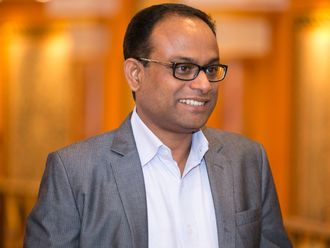
Dubai: New and alternative forms of media have made strides in embracing journalistic standards but still face issues such as credibility and censorship, according to industry insiders at Ericsson Change Makers Forum.
Jimmy Wales, founder of Wikipedia, said social media news sites need to authenticate what they put out as news while still making it relevant to their audience.
“As for infotainment, people will follow what there is and in some terms it is more popular. But then again there is value for news on Wikipedia as people follow the long trail, and for someone into music will likely read the history of the Beatles,” Wales added.
Wales also said censorship is an ongoing issue. The problem he says is with governments are not willing to understand the Internet and are trying to control it. Wikipedia is banned in China. He said governments should focus instead on security and encryptions to protect the users. “As we know, the downloading of VPNs in this country is illegal, and is punishable by law. There is no way of tracking the users, so there is no way of implementing that law,” Wales said.
Ali Jaber, Group TV Director of MBC & Dean of Mohammed Bin Rashid School of Communications, American University in Dubai, said the “process of journalism” has been adopted by major alternative media news sites. The process comes from the need to fact check stories multiple times and to write those stories in an objective and professional manner. He used VICE as an example that should be applauded, having garnered the attention of users between the ages of 18 and 34.
He criticised social media for being unreliable and even deceptive, specially smaller media outlets that are available only on one platform, such as Twitter.
However, despite the growth of social media, television is still dominant globally. Television revenue in the world with $68.5 billion (Dh251.4 billion) in 2014 and $69.5 billion in 2015, with a predicted sizable gain of $76.9 billion in 2016.
Some new media though are trying to gain market share, they lack premium content, he said.
“The content on there is less than worthy and is not a replacement for television, market penetration of television in the Kingdom of Saudi Arabia is 99 per cent.
“There is premium content on the digital space, but it is too less and too far apart.” he added. Television networks provide six hours of premium content on television that people will watch, and it is broadcasted to reach them after work in their homes. “It is where people go to get their daily fix of news and entertainment.” he said.
As for what YouTube should do, Jaber said that the site should create a branch of the website to cater to viewers after premium content. As an example, YouTube Gaming recently launched in competition to Twitch, an established gaming site that has a growing amount of premium content.
YouTube though is still managing to disrupt the television industry.
Jaber claimed that 80 per cent of quality content found on YouTube was from television while the other 20 percent consisted of hit viral videos that got the attention of the world.












